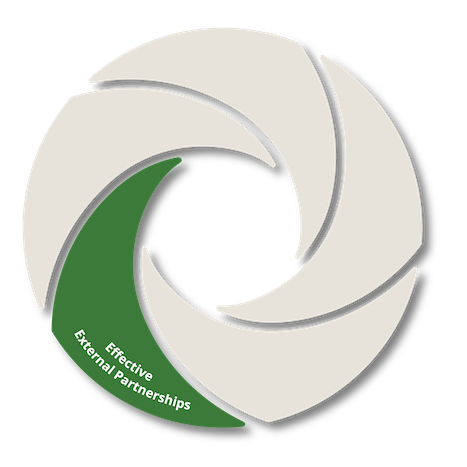District and Campus Commitments
These commitments describe the roles and responsibilities of the administrators who support, supervise, and manage the school counseling program staff.
- Administrators leverage consistent analysis of statewide and regional data, including local labor market information and college enrolment and persistence data, to best inform partnerships and course offerings.
- Administrators promote active engagement in partnerships with institutions of higher education within and outside of their region, regional employers, workforce boards, and community organizations.
- Administrators develop policies and practices to ensure that all external partners have the appropriate paperwork on file for access to necessary district facilities and are appropriately vetted to ensure the safety and security of all students.
- Administrators provide sufficient funds for contracted services and support and empower the school counseling program to collaborate with external partners to fill gaps in student service delivery.
- Administrators consider external partners part of the district’s school counseling program staff and provide allowable data sharing to support provided services.
Essential Actions
These actions describe what the most effective school counseling program staff do to implement and continuously improve an individual planning system.
Key Practices:
- Gaps in campus and district capacity to meet program goals have been identified, with special consideration for gaps in ability to serve all students equitably.
- Potential partners are selected based on their ability to address specific needs of students and families in the school community and/or fill identified gaps in the individual planning system.
- Potential partners are evaluated on the efficacy and efficiency of resources and impact on student outcomes.
Key Practices:
- External partners have a contract and/or MOU in place that outlines:
- A responsible party at the district level for program implementation, integration, and oversight.
- A responsible party at the partner entity who serves as the primary point of contact for advising program leadership in program planning, implementation, and oversight.
- Agreed upon time and space for partner entity to deliver services at the district.
- Alignment of milestones and outcomes tracking to district advising program goals and partner entity’s program goals.
- Data-sharing and confidentiality agreement aligned to caseload management system that ensures tracking of all services at the student level by advising staff.
- Transition and connection of advising services from secondary education to post-secondary pathway.
- Training agreement to show that external partners who provide direct services to students have received recent high-quality training related to fundamentals of advising and their content area of expertise.
- School counseling program leader(s) collects and maintains all contracts and/or MOUs in place with external partners.
- School counseling program leader(s) develops and maintains a database of all external partners, the points of contact, and summary of services provided that align to at least one of the effective advising content areas.
Key Practices:
- External partners are required to track and share student-level milestone and outcomes data with district, campus, and school counseling program leadership to ensure progress towards program goals.
- Data shared by external partners is consistently entered into the caseload management system to provide a clear picture of the student’s overall advising experience.
- School counseling program staff monitor contributions of external partners towards program goals as well as the student/family experience in partnership programs; staff provide frequent feedback to ensure students’ needs are being met and there is a positive impact on student outcomes.
- Partnerships that prove to be ineffective or connected to low student outcomes are terminated after a performance improvement plan is unsuccessful.
Key Practices:
- All external partners have access to relevant student-level metrics with appropriate confidentiality and data-sharing agreements in place.
- External partners consistently share out information related to their content area of expertise to be disseminated to relevant stakeholders.
- School counseling program staff ensures all external partners communicate expected student outcomes to prevent duplication of services.
- School counseling program staff facilitates regularly scheduled in-person or virtual meetings which include school counselors, advisors, and all external partners to discuss student caseloads, share information, and develop a robust referral system that leads students to the appropriate resources.

